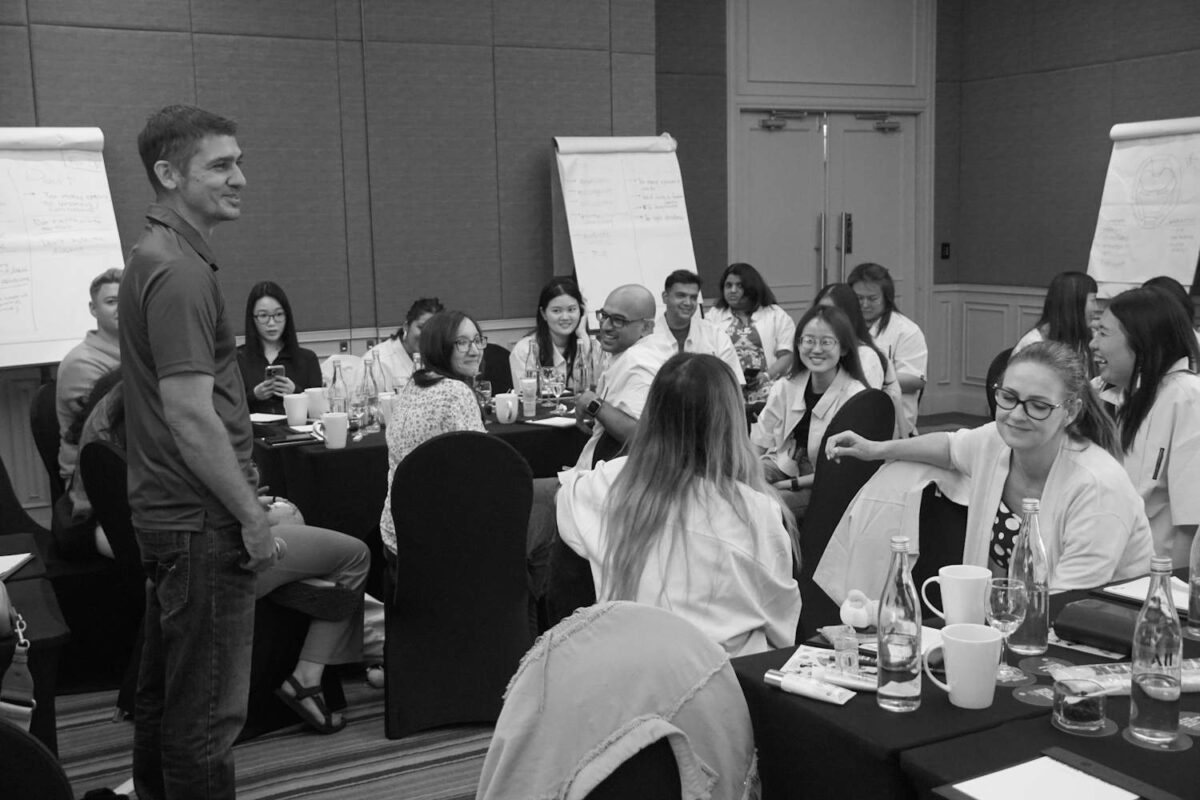As a professional facilitator, I work with business teams across the Asia–Pacific region, specialising in team development and leadership. My primary focus is helping teams collaborate more effectively through structured workshops and team development programs.
You can learn more about my team development workshops and key focus areas here.
My Style of Facilitation
My facilitation style is fun, engaging and interactive. While the topics covered in my workshops are often critical to a team’s success, I believe learning should remain lively and enjoyable. This approach keeps participants fully engaged and ensures each workshop is memorable and impactful — something my clients often mention in their feedback.
Early in my career, I attended a team training workshop in Thailand where the trainer shared ten principles for being a better team player. Point number six was, “Never take yourself too seriously.” I completely agree with this statement and am on a mission to make workplaces more fun than they often are.
My sessions are activity-driven, inclusive of both introverts and extroverts, often energetic, and filled with laughter — and I hate bullet-pointed Powerpoint slides.
Where Are You Based?
Although I am based in Thailand, I frequently travel to Singapore to run training workshops for companies and organisations. In fact, as well as Singapore, I also work in Bangkok, Phuket, and Kuala Lumpur so it doesn’t really matter where I choose to live. All of these cities are just a short flight away. Yay, AirAsia!
You’re probably wondering whether it would be too costly to fly me in from Thailand to facilitate for you. While I do add travel and accommodation costs for my Singapore engagements, my facilitation fees remain the same as Thailand and even with the additional charges you’ll probably find things quite affordable.
“Thank you for the wonderful facilitation. Everyone was highly engaged and the workshop really delivered.”
WL GORE
What Exactly Is A Facilitator?
According to the Cambridge Dictionary, a facilitator is “someone who helps a person or organisation do something more easily or find the answer to a problem by discussing things and suggesting ways of doing them.”
In practice, a facilitator is not a teacher. Rather than lecturing from the front of the room, facilitators design and lead the learning process. We understand the group’s goals, craft activities to support those objectives, guide discussions, and keep participants actively engaged throughout.
A facilitator remains neutral and impartial, focusing on creating a structure where all participants are heard and valued. Unlike coaches, who work one-on-one, facilitators typically support groups in a collaborative, one-to-many setting.
While facilitation primarily focuses on the learning process, facilitators often draw on their own expertise when beneficial. In my case, I specialise in team development and leadership, and I will often step into a trainer role to share relevant theories or frameworks when they enhance the group’s understanding.
GET STARTED: Request a Training Workshops Menu
Complete this form to receive a copy of my training workshops menu. This PDF menu presents my most popular workshop options, including prices, and offers a great starting point.
As A Facilitator, What Do I Do?
Planning and Preparation: Each engagement begins with a consultation to clarify goals and desired outcomes. I then design a structured session that defines topics, timing, activities, and learning objectives to ensure every element aligns with the client’s needs.
Leading the Session: This is where facilitation skills are truly tested. Guiding a group—sometimes a complex or dysfunctional one—requires experience, adaptability, and emotional intelligence. I help steer discussions, ask the right questions, manage conflicts when necessary, and ensure that every voice is heard, regardless of seniority or personality type.
Time Management: Facilitators keep sessions on track. We balance flexibility with structure, allowing meaningful discussions to develop while ensuring objectives are met and the session concludes on schedule.
Sparking Conversations: Facilitators know how to ask insightful questions at the right moments. Whether I’m working within my area of expertise or facilitating a technical discussion outside my domain, I use targeted questions to uncover assumptions, highlight blind spots, and draw out valuable insights from every participant.
Debriefing and Follow-Up: Each session concludes with a clear summary of learning points and actionable next steps. When required, I provide a neutral report to assist leadership teams in implementing outcomes and sustaining progress.


The Benefits of Professional Facilitation
We’ve all experienced unproductive meetings — long discussions with little progress or follow-up. A skilled facilitator prevents this by creating structure, encouraging balanced participation, and ensuring the group reaches concrete outcomes.
- Ensure all voices are heard, not just the most vocal or senior.
- Extract ideas, insights, and solutions through structured activities.
- Identify clear action steps and commitments.
- Maintain focus and momentum throughout complex discussions.
Engaging a professional facilitator transforms your offsite, workshop, or strategic meeting into a productive investment. When teams travel for multi-day sessions — with expenses for flights, accommodation, and time away from the office — it’s essential that the experience delivers real value.
Without effective facilitation, such gatherings risk becoming little more than team holidays. With skilled facilitation, they become powerful catalysts for collaboration, alignment, and change.

